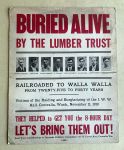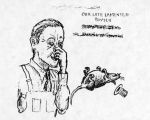Welcome to the Reuther Library's podcast archive. They are arranged by publication date with the most recent on top and the oldest at the bottom.
Subscribe to Tales from the Reuther Library on:
Don't see your favorite podcast streaming app listed here? Manually subscribe in your podcast app of choice using our podcast streaming feed: https://reutherlib.blubrry.net/feed/podcast
[Podcast] Taming the Octopus: Eli Black and the Search for Social Responsibility at the United Fruit / United Brands Company
Dr. Matt Garcia traces the legacy of Eli Black, a former rabbi who, as CEO of United Fruit/United Brands Company in the late 1960s and early 1970s, attempted to instill corporate social responsibility into the notorious fruit conglomerate before ending his life following a series of business setbacks and looming corruption scandals. read more »
[Podcast] Latinx Encounters: How Mexicans, Mexican Americans, and Puerto Ricans Made the Modern Midwest
Dr. Juan I. Mora examines three groups of Latinxs as they used postwar migration, temporary guest-worker programs, and agricultural labor to redefine migrant power, justice, and rights in the twentieth century Midwest, and particularly in Michigan. read more »
[Podcast] Under the Iron Heel: Repressing the IWW and Free Speech
Ahmed White explains how industrialists and government officials in the United States used violence and legal maneuverings to stultify the Industrial Workers of the World and silence its members in the early twentieth century. read more »
[Podcast] "Girls, We Cannot Lose!": Midwestern Black Women Activists During the Great Depression
Dr. Melissa Ford explores the influence of working-class Black women in Detroit, St. Louis, and Cleveland on the development of Black radicalism in the American Midwest during the Great Depression. Ford is an associate professor of African American history at Slippery Rock University and author of A Brick and a Bible: Black Women's Radical Activism in the Midwest during the Great Depression. read more »
[Podcast] "No Labor Dictators For Us": Revisiting Anti-Union Forces in the Flint Sit-Down Strike
While the 1936-1937 Flint Sit-Down is usually viewed as a pivotal success for the UAW, Dr. Gregory Wood considers more closely the influence of anti-union workers and the General Motors-supported Flint Alliance both during and after the strike. read more »




